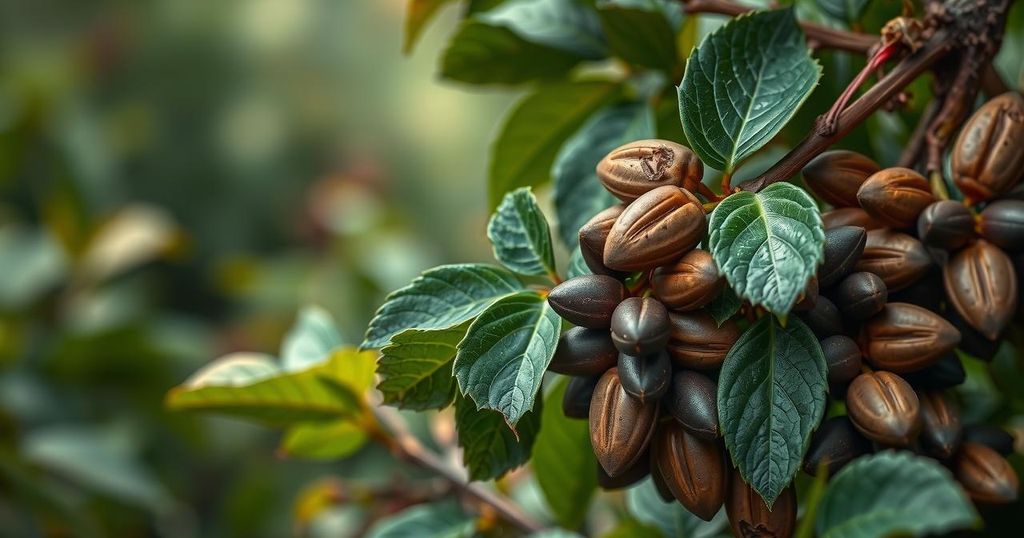Climate change is causing significant harm to cacao trees, increasing chocolate prices globally. Rising temperatures and humidity are fostering pests and diseases that threaten cacao production, particularly in major producing countries like Côte d’Ivoire and Ghana. In response, stakeholders in the U.S. and Europe are pursuing sustainable cocoa farming initiatives to counter these challenges and support farmers’ livelihoods.
Climate change is significantly impacting global chocolate production, leading to increased prices and highlighting the urgent need for sustainable cocoa farming practices in the United States and Europe. The environmental changes driven by climate variations, such as elevated temperatures and increased humidity, are detrimental to cacao trees, which thrive in a stable tropical climate typically located within 20 degrees north and south of the equator. Major cocoa-producing nations including Brazil, Côte d’Ivoire, Ghana, and Ecuador collectively account for approximately 90% of the world’s cocoa bean production, totaling around five million tonnes annually. The sensitivity of cacao trees to environmental shifts means that they do not yield beans efficiently amidst extreme weather conditions, posing significant challenges for farmers dependent on this crop. Notably, in Côte d’Ivoire and Ghana, where a majority of cocoa beans are grown, warmer, wetter climates are fostering the proliferation of harmful insect populations, such as mealybugs. These insects bring with them diseases, including a virulent virus responsible for the death of approximately 200 million cacao trees, according to the National Oceanic and Atmospheric Administration (NOAA). This loss has led to surging cocoa prices, with the United Nations Trade and Development office reporting cocoa futures reaching a record high of $10,000 per metric tonne. The same NOAA report links severe weather patterns to additional fungal diseases that further compromise cacao tree health. In response to these challenges, stakeholders in the United States and Europe are investing in sustainable cocoa initiatives. For instance, in a collaborative effort with Indonesia, the U.S. Agency for International Development launched a program aimed at training thousands of cocoa and coffee farmers in sustainable agroforestry methods to enhance soil quality and tree health in climate-affected regions. The U.S. remains a substantial player in the global chocolate market, with imports and exports totaling billions annually. In 2023, the country imported $3.9 billion and exported $1.9 billion in chocolate and cocoa products. Similarly, European countries, particularly Germany and Switzerland, are advancing initiatives to promote sustainable cocoa sourcing. Germany’s initiatives have successfully increased the share of sustainable cocoa in their markets to approximately 92.2%, while Switzerland aims for 80% by 2025 through their sustainable cocoa platform. These initiatives not only address the urgent need for sustainable cocoa supply chains but also foster significant improvements in the livelihoods of cocoa farmers and their communities, emphasizing that sustainable practices can have far-reaching benefits beyond just product availability.
The impact of climate change on agriculture is a critical topic, particularly concerning specific crops such as cacao beans, from which chocolate is produced. As temperatures rise and weather patterns become increasingly erratic, crops that are sensitive to environmental conditions, like cacao, face existential threats. Cocoa farmers, primarily located in tropical regions, are witnessing declines in production due to increasing prevalence of pests and diseases exacerbated by changing climates. This has implications not only for chocolate prices but also for the livelihoods of millions involved in the cocoa supply chain. Global efforts are thus being focused on sustainable farming practices to mitigate these impacts.
In conclusion, the nexus between climate change and cocoa production is deepening, leading to concerning implications for chocolate prices and conveying the need for urgent reform within the cocoa industry. Efforts from both governmental and non-governmental entities to adopt sustainable practices are essential in addressing the challenges posed by climate change, safeguarding both the environment and the livelihoods of cocoa farmers. By committing to sustainability, the chocolate industry can mitigate adverse impacts while also ensuring a stable supply chain for future generations.
Original Source: www.forbes.com






